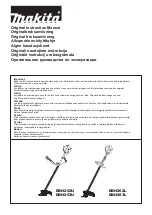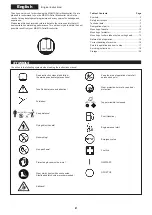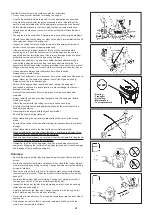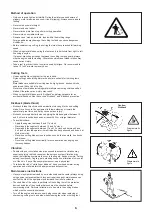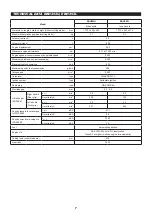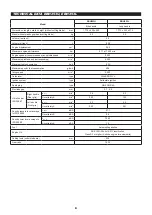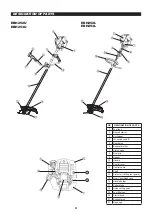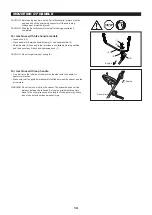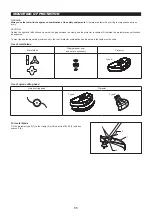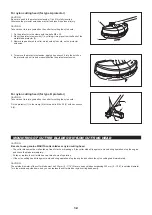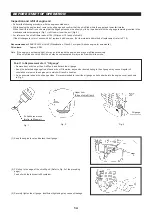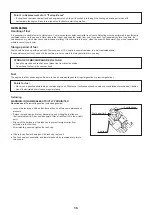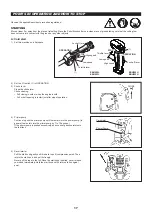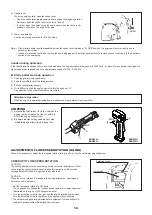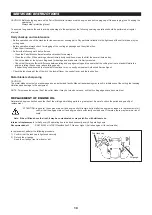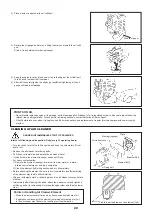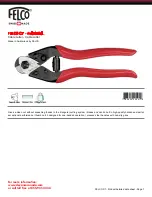
5
Caution:
Kickback
Diagrammatic
figure
Diagrammatic
figure
Method of operation
– Only use in good light and visibility. During the winter season beware of
slippery or wet areas, ice and snow (risk of slipping). Always ensure a safe
footing.
– Never cut above waist height.
– Never stand on a ladder.
– Never climb up into trees to perform cutting operation.
– Never work on unstable surfaces.
– Remove sand, stones, nails etc. found within the working range.
Foreign particles may damage the cutting tool and can cause dangerous
kick-backs.
– Before commencing cutting, the cutting tool must have reached full working
speed.
– When using metal blades, swing the tool evenly in half-circle from right to left,
like using a scythe.
If grass or branches get caught between the cutting tool and guard, always
stop the engine before cleaning. Otherwise unintentional blade rotation may
cause serious injury.
– Take a rest to prevent loss of control caused by fatigue. We recommend to
take a 10 to 20-minute rest every hour.
Cutting Tools
– Use an applicable cutting tool for the job in hand.
Nylon cutting heads (string trimmer heads) are suitable for trimming lawn
grass.
Metal blades are suitable for cutting weeds, high grasses, bushes, shrubs,
underwood, thicket, and the like.
Never use other blades including metal multi-piece pivoting chains and flail
blades. Otherwise serious injury may result.
– When using metal blades, avoid “kickback” and always prepare for an
accidental kickback. See the section “Kickback” and “Kickback prevention.”
Kickback (blade thrust)
– Kickback (blade thrust) is a sudden reaction to a caught or bound cutting
blade. Once it occurs, the equipment is thrown sideway or toward the
operator at great force and it may cause serious injury.
– Kickback occurs particularly when applying the blade segment between 12
and 2 o’clock to solids, bushes and trees with 3 cm or larger diameter.
– To avoid kickback:
•
Apply the segment between 8 and 11 o’clock;
•
Never apply the segment between 12 and 2 o’clock;
•
Never apply the segment between 11 and 12 o’clock and between 2 and
5 o’clock, unless the operator is well trained and experienced and does it at
his/her own risk;
•
Never use cutting blades close to solids, such as fences, walls, tree trunks
and stones;
•
Never use cutting blades vertically, for such operations as edging and
trimming hedges.
Vibration
– People with poor circulation who are exposed to excessive vibration may
experience injury to blood vessels or the nervous system. Vibration may
cause the following symptoms to occur in the fingers, hands or wrists: “Falling
asleep” (numbness), tingling, pain, stabbing sensation, alteration of skin color
or of the skin. If any of these symptoms occur, see a physician!
–
To reduce the risk of “white finger disease”, keep your hands warm during
operation and well maintain the equipment and accessories.
Maintenance instructions
– Have your equipment serviced by our authorized service center, always using
only genuine replacement parts. Incorrect repair and poor maintenance can
shorten the life of the equipment and increase the risk of accidents.
– The condition of the cutter, in particular of the cutting tool of the protective
devices and also of the shoulder harness must be checked before
commencing work. Particular attention is to be paid to the cutting blades
which must be correctly sharpened.
– Turn off the engine and remove spark plug connector when replacing or
sharpening cutting tools, and also when cleaning the cutter or cutting tool.
Summary of Contents for EBH252L
Page 218: ...218 ...
Page 219: ...219 ...
Page 220: ...Makita Corporation Anjo Aichi Japan 884909F987 www makita com ALA ...

